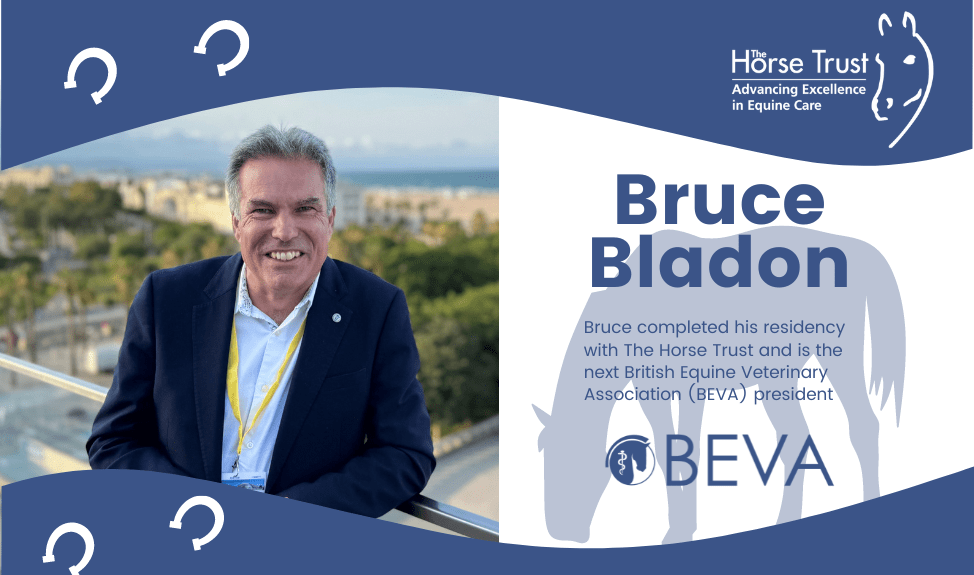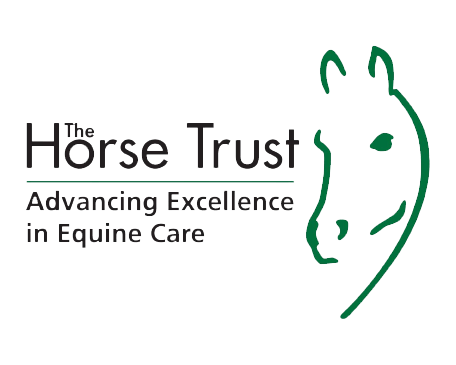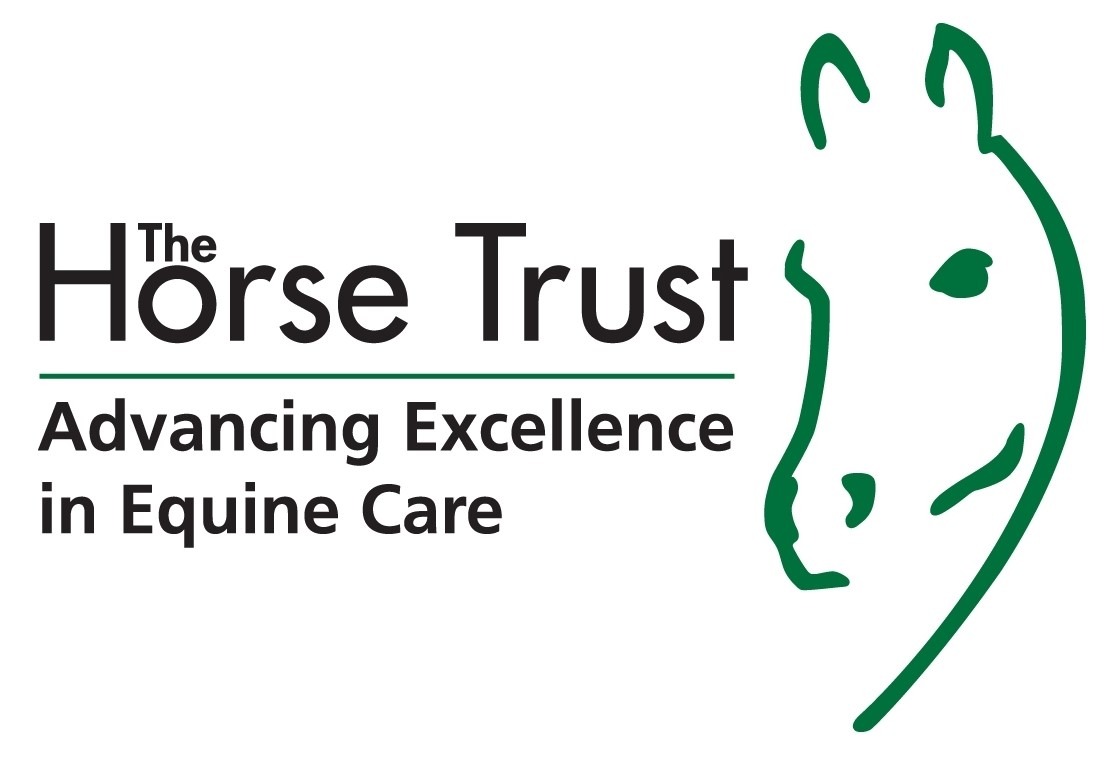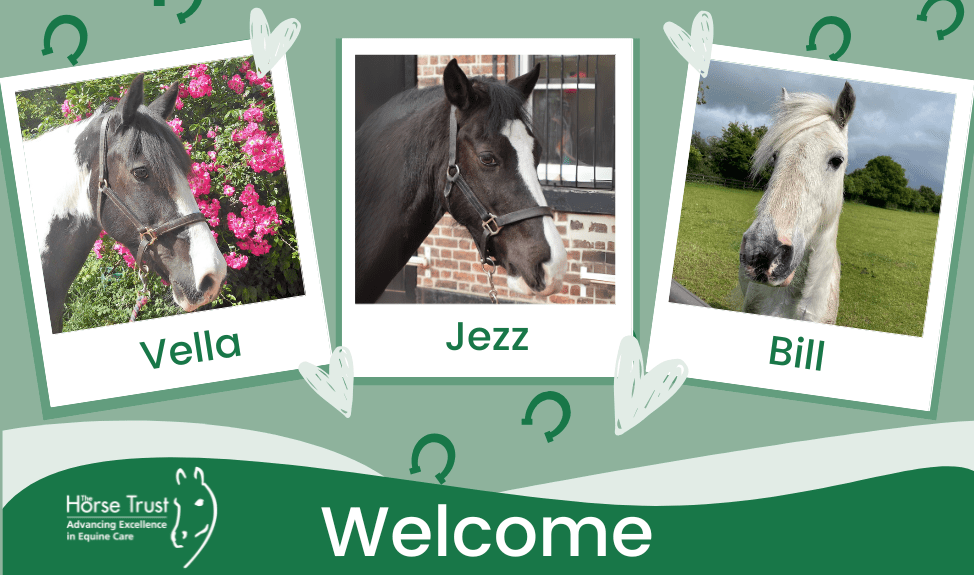The Horse Trust is delighted to welcome three remarkable horses – Jezz, Vella and Bill…

In Conversation with Bruce Bladon: Incoming President of the British Equine Veterinary Association (BEVA)
We recently had the pleasure of sitting down with Bruce Bladon, a distinguished veterinary surgeon and the upcoming British Equine Veterinary Association (BEVA) President. Why the connection to The Horse Trust?
In 1995 The Horse Trust funded Bruce’s Residency, an intensive 3-year specialist training programme at Bristol University. Resident’s work hard during this period, not only with their patients but studying and conducting research. The culmination of the training is the European Board Exams, for Diploma of the European College of Veterinary Surgeons, which Bruce passed (first time!) in 2001.
Following his Residency Bruce has gone one to be an eminent, world-renowned surgeon who has conducted clinical research and developed surgical procedures that have improved treatment options available to horses. We were overjoyed to sit down with Bruce after twenty-five years and reflect on what he has been able to achieve following the crucial support of The Horse Trust.
Thanks for sitting down with us Bruce! Please can you tell us a bit about your Horse Trust-funded residency?
Delighted to be here! The Horse Trust, or the Home of Rest for Horses as it was known back then, funded my Residency. Like human medicine, a Residency is a postgraduate training position, historically found exclusively in universities but now also in specialised practices. It typically lasts 3-4 years and prepares you for specialist exams. Most of my work is surgery, but I also do MRI, radiography, and surgical diagnostics.
Had you always wanted to work with horses?
When I went to university, I envisioned a career working with farm animals – I wanted to be dairy vet. But, during EMS or seeing practice as a vet student, I found work with horses to be the most interesting, rewarding, and satisfying. I’m not a “horsey” person; it was the diversity and scope of veterinary practice that sparked my interest. I didn’t grow up with horses—I learned to ride at university, in a very limited way and eventually married into the horse world!
What about working with horses is more rewarding?
From a vet’s point of view equine practice allows you to focus on the individual animal. Treating horses involves a perfect blend of economic and individual care, sometimes it can be like farm practice – working on a stud farm or dealing with disease outbreaks in yards. But at other times, dealing with competitive animals or beloved ponies, the scope to investigate and treat the individual animal, sometimes with expensive surgery, means the variety in horse practice is extraordinary, offering much broader scope than small animal or livestock practice.
Tell us a bit about your veterinary practice.
I’m based at Donnington Grove in Newbury. We have grown over the years and are now one of the larger equine hospitals in the UK, with MRI and CT as well as surgery facilities. My career path included a mixed practice job in Hertfordshire, followed by my first equine job in Salisbury. From there I moved to Newbury and the precursor of Donnington Grove. I’ve always been interested in surgery, which led me to Bristol for Residency training, before returning to Donnington.
How was your experience with The Horse Trust back then?
They were amazing—wonderfully hands-off, which I was grateful for during my studies as it was a busy time. Despite fully funding my residency, The Horse Trust didn’t interfere and weren’t demanding on my time. I wrote one piece for their newsletter, and that was it. Their support was invaluable, and I hope I’ve repaid their generosity through my work. Though I’ve never visited the Home of Rest, I’ve operated on horses from there and maintained a relationship with vet Nicky Housby-Skeggs over the years.
Do you have any fond memories from your career you would like to share?
A sad thing about a clinical career is that memorable cases are often difficult ones. While successful surgeries are fulfilling, it’s the challenging cases that stick with you. Learning from mistakes is crucial, and I hope that lectures I have given around the world have emphasised attention to this. I remember some horses which have gone on to achieve amazing things after surgery, going to the Olympics, winning Classic races or giving birth to successful foals. But the reality is, these were often simple surgeries, and I was lucky to have the opportunity to operate on such amazing horses. I like to think my contributions to knowledge, particularly in tendon sheath lacerations, have made a significant impact. What was once an almost universally fatal condition now having a pretty good success rate.
Does having a network at British Equine Veterinary Association (BEVA) help in the more challenging aspects of being a vet?
Absolutely. One of the best aspects of being a horse vet is the collegial atmosphere. The profession isn’t intensely commercial, so we freely discuss cases and share experiences, both good and bad. BEVA congresses and other meetings foster this sense of community, which is invaluable.
Congratulations on being elected as BEVA president!
Thank you. It’s a four-year track: three years in, one year out. Next year, the power will be mine!
How was your experience at the Rio Olympic Games?
It was fabulous. I was invited by a friend to speak at a congress in Brazil, which led to an offer to be the equine surgeon at the Rio Olympics. The experience was wonderful, despite initial concerns about safety and health risks due to tropical diseases. The event was incredibly well-organised, and Rio is a stunning city. The health bubble created around the Olympic site ensured the safety of the horses without needing to be quarantined for months, and ultimately, I was only needed for treating a few minor cases.
What does your day look like today?
This morning, I was at another appointment. This afternoon, I’ll be operating on a horse’s fetlock. It is a rare day at Donnington that we don’t do any surgery, but sadly I am now often involved in meetings with BEVA work, and with corporate policy meetings, which are much less exciting. More excitingly, tomorrow I’m heading to Boston soon to see my son graduate!
We’d better not keep Bruce any longer. Despite a busy day of veterinary procedures, we were grateful he made time to tell us about his interesting and versatile career. Thanks, Bruce. We must fix the fact that you haven’t visited!
The Horse Trust relies entirely on public support to continue to help our herd, and horses all over.
Thank you for making an impact with us.















Comments (0)